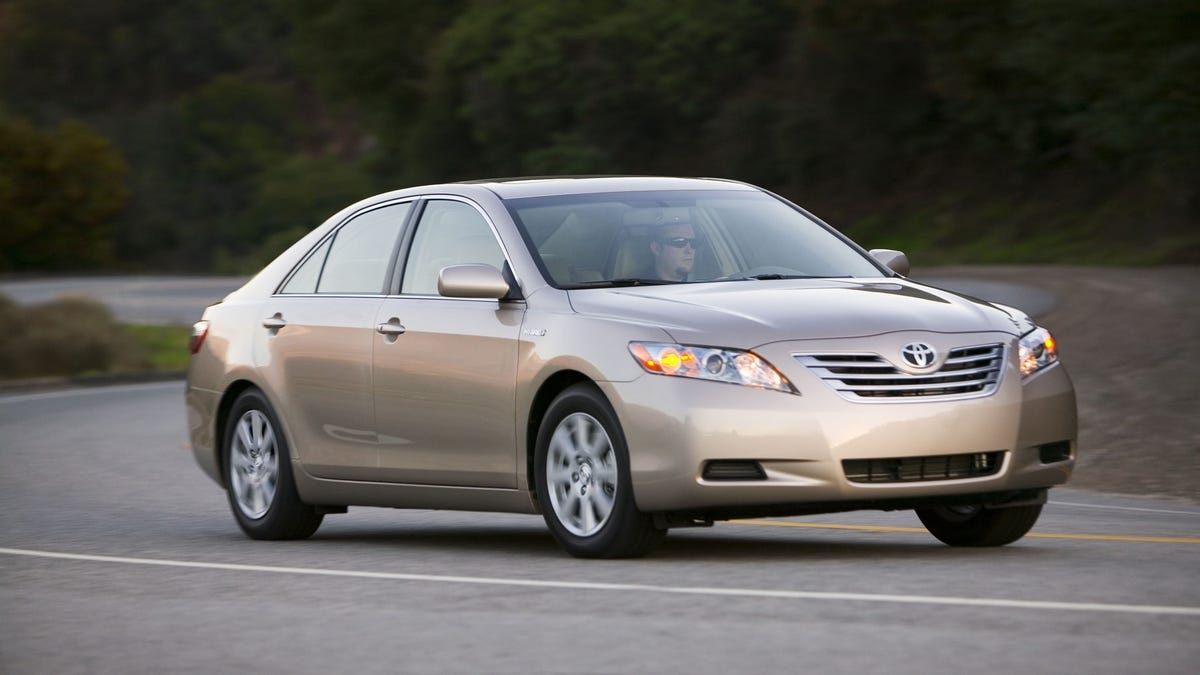What color green suits you?
A quick look at two popular gasoline-electric hybrids and one clean diesel.

In recent months, I've driven three very different high-fuel economy, low-emissions "green" cars. Two were gasoline-electric hybrids: the Toyota Camry Hybrid and the Honda Civic Hybrid. The third was the Volkswagen Jetta TDI turbodiesel. How do they compare in driving experience and fuel economy?
Hybrids are environmental poster children, but diesel, green? Well, yes, if it has a modern clean diesel engine, designed and built to run on ultralow sulfur diesel fuel and equipped with the latest aftertreatment technologies. The Jetta TDI was recently named "Green Car of the Year" at the 2008 Los Angeles Auto Show.
The cars were not driven back-to-back over the same roads in the same conditions, so this is not a scientific comparison. The two hybrids were regular weekly test cars, driven on local city streets, backroads, and highways in as much the same manner as is possible with two different vehicles at different times. The TDI was driven on the canyon roads, secondary roads, and freeways of the Los Angeles area during the press introduction.
Toyota's full hybrid system has been refined over the years for smoother transitions between power modes and greater electric-only operation. Most of the time it's very smooth, and often silently electric up to as much as 30 mph in light-throttle driving as when starting--and accelerating slowly--or creeping in traffic. With the 2.4-liter, 147-horsepower engine and 141-hp motor working together to produce a maximum of 187 hp when needed, power is never inadequate, even for passing or acceleration at 60+ mph highway speeds. To me, the greatest drawback is the sometimes nonlinear throttle response. The electric motor kicks in to add power when the managing computer says so, and that sudden, not necessarily expected, surge can be a little annoying if you're a control freak about drivetrains. Such people probably won't be hybrid buyers, and the power surge is really no worse than what is experienced when an older automatic transmission hunts for a gear on a hill or hesitates before downshifting. Annoying but not serious. Fuel economy: EPA 33 city, 34 highway; I saw 35, not bad at all for a car this size.
Honda's "Integrated Motor Assist" (IMA) hybrid system started life as electric motor assistance for a gasoline engine. Think electric turbocharger. More recently, it can operate at times in electric-only mode, at least according to Honda's literature. If my Civic Hybrid did that during my time driving, I failed to notice. Which means either a) I had a heavy foot (guilty) and it never did, or b) the system is very, very smooth in transition. More investigation required. On the plus side, throttle response was no different than for a gasoline engine/CVT transmission combo, predictable with no surprises. The Civic is smaller and lighter than the Camry, with a sportier suspension tuning, for a more enthusiastic driving experience. Downside: the 1.3-liter engine does most of the work, assisted by a 15kW (20 hp) electric motor for a system maximum of 110 hp and 123 lb-ft of torque. Around town low-speed performance is very good, but highway acceleration is leisurely at best. At one point on a steep highway grade,I had the car flat-out to try to maintain a 65-mph speed to keep up with traffic. It managed, barely. And I watched the then-35mpg average drop very quickly to 27. EPA ratings are 40 mpg city, 45 highway. I saw 34. Sometimes a small engine working hard uses more fuel than a more-powerful engine that is not pushed as hard.
Volkswagen has been number one in diesel car sales in the US since the days of the Rabbit Diesel in the '70s, not that that is a huge number. Current diesel technology has come at least as far as gasoline-engine technology in the past thirty years, and thanks to electronic direct fuel injection, improved combustion chamber design, turbocharging, and sophisticated in-vehicle treatment of the exhaust gases, today's TDI is as far from a slow and smoky Rabbit as a Corvette ZR1 is from the sadly de-powered disco-era 'Vette. For people whose idea of driving involves as much control as possible, the new Jetta TDI is even offered with a manual transmission (in the base model, at least) as well as the DSG automated manual. In a spirited drive through the LA canyons, trying my best to get the worst mileage possible, I could go no lower than 32 mpg with the stick. Note that no freeway or even city miles were involved, strictly backroad fun. In more sedate conditions, with the DSG, and with some freeway driving, mileage improved to 38. Drivers who tried for the best possible mileage managed 44. The EPA lists the manual at 30/41, with 29/40 for the automatic.
YMMV, of course for mileage. But high mileage and low emissions are not necessarily only hybrid attributes. The choice of hybrid or diesel is a personal preference. If you drive extensively in stop-and-go traffic, or do much city driving with time spent stopped getting 0 mpg at stoplights, condolences, and a hybrid makes sense. If you spend more time on the open road, consider one of the new-generation diesels.